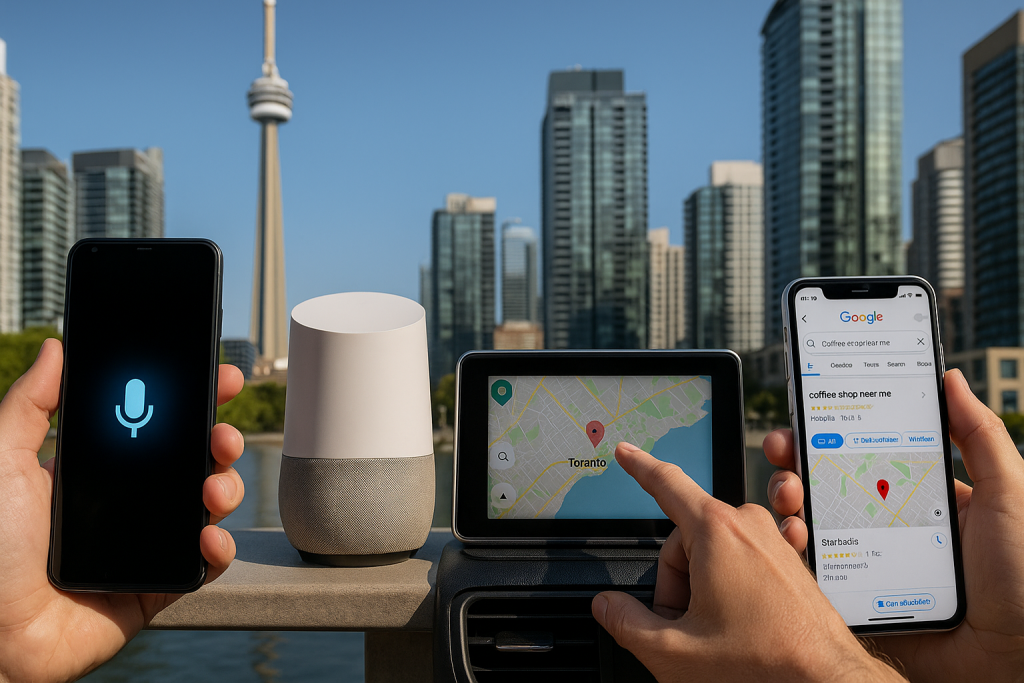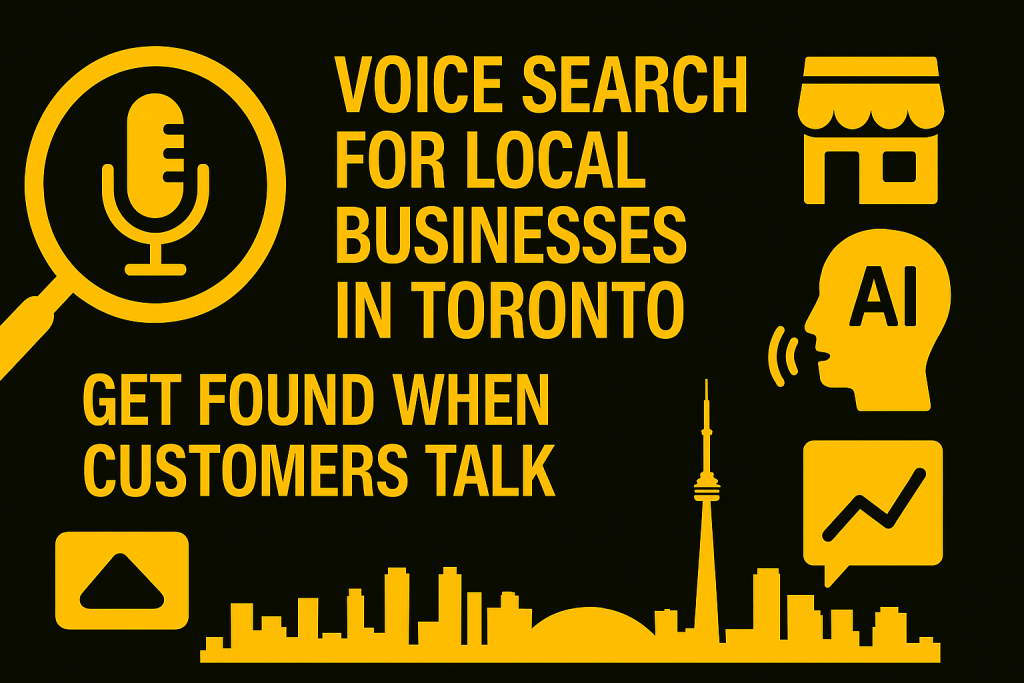Voice search is no longer a trend—it is a dominant behaviour in local search across Toronto. With Siri, Google Assistant, and Alexa becoming part of daily life, customers now ask for businesses the same way they speak to real people. Local companies that optimize for voice search gain a direct advantage in Google Maps visibility, “near me” results, and conversational long-tail keywords.
Toronto consumers rely on hands-free queries while driving on the Gardiner, checking store hours while walking through Yonge–Dundas Square, or asking smart speakers for “the best pizza near me.” Businesses that adapt their SEO for natural speech patterns earn more calls, direction requests, and bookings—plain and simple.
This comprehensive guide explains how voice search works for Toronto businesses, how to optimize your website and Google Business Profile, and why conversational queries matter more today than ever.
Understanding How Torontonians Use Voice Search for Local Business Discovery
Voice search is built on natural language. Instead of typing “best dentist Toronto”, users say:
“Hey Google, who’s the best dentist near me?”
“Siri, find a plumber open right now in Scarborough.”
“Alexa, book me a haircut in downtown Toronto.”
These queries are longer, more conversational, and often urgent. They also favour businesses with strong local SEO, optimized Google Business Profiles, and websites that match spoken language instead of robotic keyword patterns.
Local SEO experts across Toronto continue to emphasize voice search in modern strategies. In fact, insights from posts like Toronto Local SEO: Why Your Business Isn’t Showing Up on Google Maps consistently highlight the importance of aligning your content with how real people search.
Why Voice Search Matters for Local Toronto Businesses in 2025
1. Toronto’s On-the-Go Lifestyle Favors Voice Search
Professionals commuting on the TTC, families navigating busy schedules, and shoppers walking around Queen Street rely heavily on hands-free queries. “Near me” voice searches are skyrocketing, especially in areas like:
North York
Etobicoke
Downtown Core
Midtown
Scarborough
Toronto is one of Canada’s most mobile-first cities—voice search usage reflects that.
2. Google Prioritizes Conversational Queries
Google’s latest algorithm updates are pushing search engines toward intent, context, and spoken language patterns, similar to what’s explored in Understanding Google’s Latest Algorithm Update. Voice search aligns perfectly with these changes.
3. Voice Queries Lead to Immediate Action
Most voice searches are transactional:
“Where can I buy…”
“Call the closest…”
“Book a…”
“Find a nearby…”
Toronto businesses that optimize for these commands convert significantly more callers and walk-ins.
How Voice Search Works in Google for Toronto Local Businesses
Voice search pulls from three main data sources:
1. Google Business Profile (GBP)
This is the most important ranking factor for voice search. Google Assistant uses your GBP data to answer:
Store hours
Address
Phone number
Reviews
Business description
Popular times
Services
Questions & Answers
For deeper optimization strategies, see Optimize Google Business Profile Toronto.
2. Your Website Content
Your site must include conversational content such as:
FAQ sections
Long-tail questions
Localized service pages
3. High-Authority External Data
Google often cross-references:
Government business registries
Official directories
Trusted resources (example: Government of Ontario business guidelines)
These signals help validate your business’s legitimacy and reliability.
Key Voice Search Optimization Strategies for Toronto Brands
Optimizing Google Business Profile for Voice Search Visibility
Complete Every Section of Your GBP
Voice search heavily depends on fully completed profiles. This includes:
Primary & secondary categories
Business description
Photos & videos
Services & products
Service areas (Toronto + GTA regions)
Use Conversational Language in Your Description
Instead of robotic descriptions, write naturally:
“We help Toronto homeowners with fast, reliable drain repairs—available 24/7 across Scarborough, North York, and Etobicoke.”
This matches how people speak when searching.
Encourage Voice-Friendly Reviews
Reviews using natural language boost voice ranking. Example:
“They fixed my AC in less than an hour and came out to my Etobicoke condo fast.”
Reviews like this help Google match user intent.
For more insights, explore Review Strategy for GTA Businesses.

Build Voice-Friendly Website Content
Use Long-Tail Conversational Keywords
Examples:
“Who is the best locksmith near me in Toronto?”
“Where can I get emergency dental care in North York?”
“What is the closest coffee shop open now?”
Create FAQ Pages Answering Spoken Queries
Google loves FAQ formats for voice search.
Answer questions beginning with:
Who
What
Where
When
Why
How
Optimize for Local Intent
Include neighbourhood-based modifiers:
Toronto
North York
Midtown
York Region
Scarborough
Downtown Toronto
This increases relevance in voice results and the Google 3-Pack—covered in depth in Local SEO Toronto Playbook.
Improve Technical SEO for Voice Search
Voice search relies on fast, accessible websites. Here’s what Toronto businesses must fix:
1. Mobile Speed & Core Web Vitals
Slow sites don’t rank in voice search.
(See Core Web Vitals Toronto for optimization details.)
2. HTTPS Security
Google Assistant prefers secure websites.
3. Schema Markup for Structured Answers
Implement:
LocalBusiness schema
FAQ schema
Review schema
Service schema
This helps smart assistants read your site clearly.
For more structured data insights, consult Google’s documentation.
Voice Search and AI: The Future of Local SEO in Toronto
AI-powered search is merging with voice faster than ever. This evolution is explored in The Impact of AI on Voice Search SEO for Toronto Businesses.
AI Enhances Voice Search By:
Predicting user intent
Improving local rankings
Understanding natural language
Delivering hyper-local results
Suggesting businesses with strong authority
Businesses that combine local SEO with AI-driven optimization outperform competitors stuck using outdated strategies.
Creating Hyperlocal Content That Matches Spoken Queries
1. Add “Near Me” Variants Naturally
Examples:
“best chiropractor near me in Toronto”
“pet groomer near me open today”
2. Use Real Conversational Phrasing
Instead of writing:
“Emergency plumbing Toronto 24/7”
Write:
“If you need a plumber right now in Toronto, you can call us 24/7.”
3. Include Local Landmarks
Google uses them for proximity signals:
CN Tower
Yonge–Dundas Square
Scarborough Town Centre
Yorkdale Mall
This helps contextualize your location.
Why Toronto Businesses That Ignore Voice Search Lose Market Share
Younger demographics rely on smart speakers
Toronto households increasingly use Google Home and Amazon Echo for everyday tasks.
Car voice assistants dominate driving behaviour
“Find gas station near me”
“Where is the closest repair shop?”
Competitors are optimizing aggressively
Insights from Top SEO Agencies in Toronto show leading firms are doubling down on:
AI SEO
Voice search
Google Business Profile optimization
Those who delay fall behind in the Google Maps 3-Pack.
Best Practices for Toronto Businesses Targeting Voice Search
Add full service descriptions to GBP
Answer questions using natural, conversational language
Include Toronto neighbourhood keywords
Write comprehensive FAQs
Optimize for mobile devices
Add schema markup
Improve GBP reviews
Create local landing pages
For more strategies, refer to How Toronto SEO Agencies Build Winning Strategies.
Internal Links Integrated Naturally in This Article
Contact Page Internal Link:
For expert voice search optimization for Toronto businesses, visit the TorontoSEO.com Contact Page.
Frequently Asked Questions (FAQs)
1. How does voice search affect Toronto local SEO?
It prioritizes businesses with strong GBP optimization, conversational content, and localized keywords.
2. What devices customers use for voice search in Toronto?
Google Assistant, Siri, Alexa, and car voice assistants (Android Auto, Apple CarPlay).
3. Does “near me” optimization help with voice search?
Yes. Most voice queries include proximity-based commands like “near me” or “closest.”
4. Should Toronto businesses use FAQ schema for voice search?
Absolutely—FAQ schema increases the chances of being selected as a spoken answer.
5. How do reviews impact voice search visibility?
Reviews that mention neighbourhoods, services, and real experiences improve voice ranking signals.


